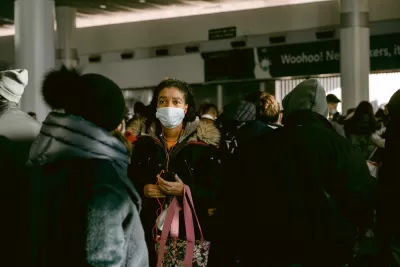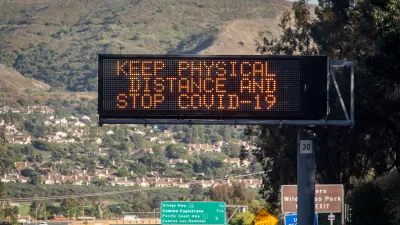Don't count on Omicron ending the pandemic, cautioned America's top infectious disease expert on Jan. 17. "Get ready to learn new Greek letters," warned the Associated Press as daily COVID deaths topped the peak set in the Delta wave.

"Is 2022 the year we go from pandemic to endemic?" the moderator of an online panel discussion asked Anthony S. Fauci, the chief medical advisor to President Joe Biden, during the Davos Agenda, a virtual event held by the World Economic Forum on January 17.
"Dr. Anthony Fauci said it is still too early to predict if the rapidly spreading Omicron variant will mark the end of the COVID-19 pandemic — and usher in the endemic stage of the illness," wrote Yaron Steinbuch who reported on the discussion for the New York Post.
“When you talk about whether or not Omicron — because it’s as highly transmissible but apparently not as pathogenic, for example, as Delta — I would hope that that’s the case,” Fauci said Monday.
[Correspondent's note: According to a recent Danish study, "the rapid spread of the Omicron (variant) primarily can be ascribed to the immune evasiveness rather than an inherent increase in the basic transmissibility." Vaccine expert Paul Offit confirmed that description in an opinion in MedPage Today on Jan. 12: "What makes Omicron difficult is, although everybody talks about how it's more contagious, it technically is really not more contagious...There's no evidence that it's more contagious. The problem with Omicron is that it is, to some extent, immune evasive."]
Fauci added during the video panel discussion (via Bloomberg video):
“It is an open question as to whether or not Omicron is going to be the live virus vaccination that everyone is hoping for because you have such a great deal of variability with new variants emerging."
Additional reading on the Davos panel discussion is available on Bloomberg News, CNBC and STAT.
More variants ahead
"Get ready to learn more Greek letters," warned Laura Ungar for The Associated Press on January 15. She addressed the popular belief that after the Omicron wave subsides, COVID-19 will transition from a pandemic to an endemic.
“People have wondered whether the virus will evolve to mildness," said Dr. Stuart Campbell Ray, an infectious disease expert at Johns Hopkins University. "But there’s no particular reason for it to do so. I don’t think we can be confident that the virus will become less lethal over time.”
Simon Clarke, an associate professor in cellular microbiology at the University of Reading, is of the same opinion, and also more direct. CNN anchor, Paul Newton, asked Clarke on December 31, 2021, "In your opinion, could this epic wave of infections actually usher in a virus that is weaker and less dangerous and will remain that way?"
"Well, all throughout this, for nearly two years, I've been hearing how this is going to happen," responded Clarke. "How this is inevitable and how [this is] what happens with viruses. I've even heard that it's the definition of viruses."
"It's absolutely not. It's something that can happen. Virus ability to cause disease can go up as well as down. The idea that we're heading in one direction and that it will not turn around or cannot turn around and become more disease-causing in some respect, is nonsense."
Another Omicron milestone reached: deaths
Omicron, which shattered daily case records both in the U.S. and globally on December 27, continues to spread like the tidal wave that UK Prime Minister Boris Johnson had warned on December 12.
In the U.S., the 7-day average of daily deaths caused by the coronavirus topped 2,160 on January 21, two years to the day that the first case of coronavirus was recorded by the Centers for Disease Control and Prevention, exceeding the peak set during the Delta surge of 2,109 on September 22, 2021, according to The New York Times coronavirus tracker. The 44% increase during the past two weeks exceeded the increases in the other two COVID metrics:
- Cases up 11% to a 7-day average > 720,000.
- Hospitalizations up 30% to a 7-day average of nearly 160,000. Omicron had already broken the hospitalization record on January 11.
Daily average deaths were higher during the first surge, particularly in the Northeast, and last winter, according to the "new reported deaths by day" graph on the Times tracker:
- April 17, 2020: 2,222
- January 13, 2021: 3,326
Nearly 5,600,000 people have died from the novel coronavirus on January 23, the two-year anniversary of the lockdown of Wuhan, China, according to the Times global tracker, including over 865,000 Americans, over 15% of the total despite the U.S. accounting for about 4.25% of world population.
Pandemic will end
Finally, regardless of what follows Omicron, STAT writer Helen Branswell reminds us, "The truth of the matter is that pandemics always end," in a piece written last May, well before the Delta wave would shatter President Biden's "summer of freedom." She describes the last four pandemics and notes:
And to date vaccines have never played a significant role in ending them. (That doesn’t mean vaccines aren’t playing a critical role this time. Far fewer people will die from Covid-19 because of them.)
Those prior pandemics, all caused by flu viruses, became endemic when "[o]ur immune systems learned enough about them to fend off the deadliest manifestations of infection, at least most of the time," she adds.
If the pattern holds, and it is expected to, SARS-2 will at some point join a handful of human coronaviruses that cause colds, mainly in the winter, when conditions favor their transmission.
When will that happen? That’s the big, unanswerable question.
Related in Planetizen:
- Pandemic Endgame: Danish Epidemiologist's Prediction, January 10, 2022
- Post-Pandemic: Living with COVID, January 31, 2021
-
[World Economic Forum] Report: Last-Mile Deliveries to Increase 78% by 2030, January 29, 2020
Hat tip to Kaiser Health News: Omicron May Not Be At Peak In US Yet, Health Officials Caution.
FULL STORY: Fauci: Too soon to tell if Omicron variant will help bring end to pandemic

Alabama: Trump Terminates Settlements for Black Communities Harmed By Raw Sewage
Trump deemed the landmark civil rights agreement “illegal DEI and environmental justice policy.”

Planetizen Federal Action Tracker
A weekly monitor of how Trump’s orders and actions are impacting planners and planning in America.

Why Should We Subsidize Public Transportation?
Many public transit agencies face financial stress due to rising costs, declining fare revenue, and declining subsidies. Transit advocates must provide a strong business case for increasing public transit funding.

Understanding Road Diets
An explainer from Momentum highlights the advantages of reducing vehicle lanes in favor of more bike, transit, and pedestrian infrastructure.

New California Law Regulates Warehouse Pollution
A new law tightens building and emissions regulations for large distribution warehouses to mitigate air pollution and traffic in surrounding communities.

Phoenix Announces Opening Date for Light Rail Extension
The South Central extension will connect South Phoenix to downtown and other major hubs starting on June 7.
Urban Design for Planners 1: Software Tools
This six-course series explores essential urban design concepts using open source software and equips planners with the tools they need to participate fully in the urban design process.
Planning for Universal Design
Learn the tools for implementing Universal Design in planning regulations.
Caltrans
Smith Gee Studio
Institute for Housing and Urban Development Studies (IHS)
City of Grandview
Harvard GSD Executive Education
Toledo-Lucas County Plan Commissions
Salt Lake City
NYU Wagner Graduate School of Public Service





























